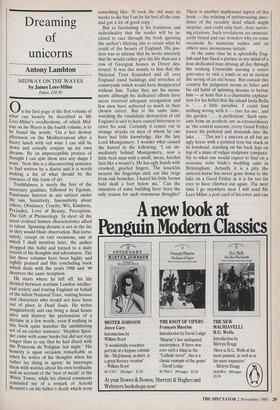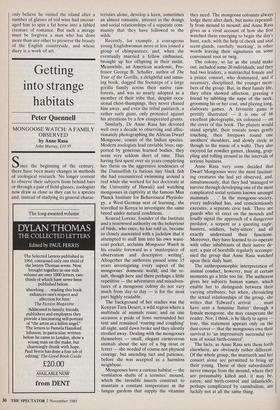Dreaming of unicorns
Antony Lambton
MIDWAY ON THE WAVES by James Lees-Milne Faber, 170.95
0 n the first page of the first volume of what can loosely be described as Mr Lees-Milne's recollections, of which Mid- way on the Waves is the fourth volume, is to be found the words: 'On a hot drowsy afternoon on the Mediterranean after a heavy lunch with red wine I can still lie down and actually conjure up my own dreams. By an imperceptible process of thought I can spin them into any shape I want.' Now this is a disconcerting sentence to find written by a diarist and it is worth making a list of what should be the essences of this form of art.
Truthfulness is surely the first of the necessary qualities, followed by Egoism, Passionate Interest in any subject under the sun, Sensitivity, Insensitivity about others, Obstinacy, Cruelty, Wit, Kindness, Prejudice, Love of Beauty, Perception, The Gift of Phraseology. In short all the usual civilised human characteristics allied to talent. Spinning dreams is not in the list as they would blunt observation. But fortu- nately, except on rare occasions, one of which I shall mention later, the author dropped this habit and turned to a daily record of his thoughts and adventures. The last three volumes have been highly and rightly praised and this concluding book which deals with the years 1948 and '49 deserves the same reception.
He starts where he left off, his life divided between wartime London intellec- tual society and touring England on behalf of the infant National Trust, visiting houses and characters who would not have been out of place in Dead Souls. He writes imaginatively and can bring a dead house alive and destroy the pretensions of a lifetime in a few words, even if nothing in this book quite matches the annihilating wit of an earlier sentence: 'Stephen Spen- der came with some books but did not stop longer than to say that he had dined with the Princesse de Polignac last night.' His honesty is upon occasion remarkable as when he writes of his thoughts when his father lay dying in agony: he interrupts them with worries about his own toothache and an account of the 'best of meals' at the White Tower, while his clinical comments reminded me of a remark of Arnold Bennett's on his father's death which went something like: 'It took the old man six weeks to die but I sat by his bed all the time and got a lot of good copy.'
But so fascinating is his frankness and individuality that the reader will be in- clined to race through the book ignoring the author's lifelong aim to retain what he could of the beauty of England. His pas- sion was so intense that he wrote sincerely that he would rather give his life than see a row of Georgian houses in Dover des- troyed. It was due mainly to him that the National Trust flourished and all over England stand buildings and stretches of countryside which would have disappeared without him. Today they are his monu- ments although his dedicated efforts have never received adequate recognition and few men have achieved so much in their chosen career. But at the same time, watching the vandalistic destruction of old England is said to have caused bitterness to enter his soul. Certainly it comes out in strange attacks on men of whom he can have had little knowledge, like the late Lord Montgomery. I wonder what caused the hatred in the following: 'I sat im- mediately behind Montgomery, now a little bent man with a small, mean, hatchet face like a weasel's. He has ugly hands with crooked, gnarled fingers. The knuckles nearest the fingertips stick out like twigs from oak branches. I hated his little brown bald skull a foot below me.' Can the ruination of some building have been the only reason for such venomous thoughts? There is another unpleasant aspect of this book — the relating of embarrassing anec- dotes of the recently dead which might surprise, and could only hurt, close surviv- ing relations. Such revelations are unneces- sarily brutal and one wonders why on some occasions he mentions names and on others uses anonymous initials.
At the same time he is splendidly Eng- lish and has fixed a picture in my mind of a lean dedicated man driving all day through the soaking Cotswolds nursing a secret grievance to visit a tomb or set in motion the saving of an old house. But outside this country his judgment seems to falter and his old habit of spinning dreams to betray him — at least that is a charitable explana- tion for his belief that the island Isola Bella is `. . a little paradise. I could find nothing wrong with it — rare for me', and the garden `. . is perfection'. Such opin- ions from an aesthete are as extraordinary as 'the central unicorn, every Good Friday leaves his pedestal and descends into the lake . ,' This isn't a unicorn at all but an ugly horse with a pointed iron bar stuck in its forehead, standing on his back legs on top of a mass of vulgar sculpture compara- ble to what one would expect to find on a nouveau riche bride's wedding cake in Birmingham. Actually it is a pity the unicorn-horse has never gone down to the lake on a Good Friday as it is far too fat ever to have climbed out again. The next time I go anywhere near I will send Mr Lees-Milne a post card of his error and can only believe he visited the island after a number of glasses of red wine had encour- aged him to spin a fat horse into a fabled creature of romance. But such a mirage must be forgiven a man who has done more than any other to preserve the beauty of the English countryside, and whose diary is a work of art.























































 Previous page
Previous page